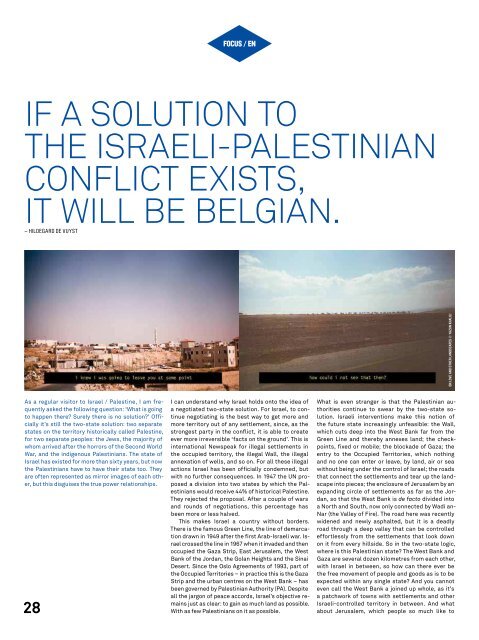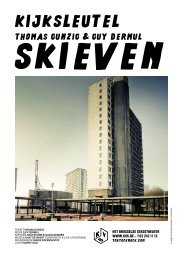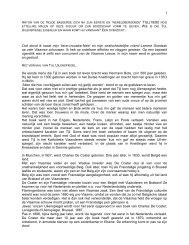februari-juni - KVS
februari-juni - KVS
februari-juni - KVS
You also want an ePaper? Increase the reach of your titles
YUMPU automatically turns print PDFs into web optimized ePapers that Google loves.
28<br />
focus / en<br />
if a solution to<br />
the israeli-palestinian<br />
conflict exists,<br />
it will Be Belgian.<br />
– HILdEGARd dE VuySt<br />
As a regular visitor to Israel / Palestine, I am frequently<br />
asked the following question: ‘What is going<br />
to happen there? Surely there is no solution?’ Officially<br />
it’s still the two-state solution: two separate<br />
states on the territory historically called Palestine,<br />
for two separate peoples: the Jews, the majority of<br />
whom arrived after the horrors of the Second World<br />
War, and the indigenous Palestinians. The state of<br />
Israel has existed for more than sixty years, but now<br />
the Palestinians have to have their state too. They<br />
are often represented as mirror images of each other,<br />
but this disguises the true power relationships.<br />
I can understand why Israel holds onto the idea of<br />
a negotiated two-state solution. For Israel, to continue<br />
negotiating is the best way to get more and<br />
more territory out of any settlement, since, as the<br />
strongest party in the conflict, it is able to create<br />
ever more irreversible ‘facts on the ground’. This is<br />
international Newspeak for illegal settlements in<br />
the occupied territory, the illegal Wall, the illegal<br />
annexation of wells, and so on. For all these illegal<br />
actions Israel has been officially condemned, but<br />
with no further consequences. In 1947 the UN proposed<br />
a division into two states by which the Palestinians<br />
would receive 44% of historical Palestine.<br />
They rejected the proposal. After a couple of wars<br />
and rounds of negotiations, this percentage has<br />
been more or less halved.<br />
This makes Israel a country without borders.<br />
There is the famous Green Line, the line of demarcation<br />
drawn in 1949 after the first Arab-Israeli war. Israel<br />
crossed the line in 1967 when it invaded and then<br />
occupied the Gaza Strip, East Jerusalem, the West<br />
Bank of the Jordan, the Golan Heights and the Sinai<br />
Desert. Since the Oslo Agreements of 1993, part of<br />
the Occupied Territories – in practice this is the Gaza<br />
Strip and the urban centres on the West Bank – has<br />
been governed by Palestinian Authority (PA). Despite<br />
all the jargon of peace accords, Israel’s objective remains<br />
just as clear: to gain as much land as possible.<br />
With as few Palestinians on it as possible.<br />
What is even stranger is that the Palestinian authorities<br />
continue to swear by the two-state solution.<br />
Israeli interventions make this notion of<br />
the future state increasingly unfeasible: the Wall,<br />
which cuts deep into the West Bank far from the<br />
Green Line and thereby annexes land; the checkpoints,<br />
fixed or mobile; the blockade of Gaza; the<br />
entry to the Occupied Territories, which nothing<br />
and no one can enter or leave, by land, air or sea<br />
without being under the control of Israel; the roads<br />
that connect the settlements and tear up the landscape<br />
into pieces; the enclosure of Jerusalem by an<br />
expanding circle of settlements as far as the Jordan,<br />
so that the West Bank is de facto divided into<br />
a North and South, now only connected by Wadi an-<br />
Nar (the Valley of Fire). The road here was recently<br />
widened and newly asphalted, but it is a deadly<br />
road through a deep valley that can be controlled<br />
effortlessly from the settlements that look down<br />
on it from every hillside. So in the two-state logic,<br />
where is this Palestinian state? The West Bank and<br />
Gaza are several dozen kilometres from each other,<br />
with Israel in between, so how can there ever be<br />
the free movement of people and goods as is to be<br />
expected within any single state? And you cannot<br />
even call the West Bank a joined up whole, as it’s<br />
a patchwork of towns with settlements and other<br />
Israeli-controlled territory in between. And what<br />
about Jerusalem, which people so much like to<br />
on loVe anD other lanDscapes © yazan khalili<br />
portray as an East (Palestinian) and a West (Israeli),<br />
neatly divided rather like East and West Berlin?<br />
Everything runs through it and there’s a struggle<br />
for every inch of land and every house, though the<br />
means used are unequal. Any way of forcing Palestinians<br />
out of Jerusalem is a good way: refusing<br />
them planning permission, expulsion and demolition<br />
for real or supposed planning offences, and<br />
all manner of administrative torments. To give one<br />
example, any Palestinian inhabitant of Jerusalem<br />
who transports a resident of the West Bank in their<br />
car risks having it confiscated.<br />
Why does the Palestinian Authority stick to the<br />
two-state solution when Israel makes it increasingly<br />
clear it does not want a viable Palestinian<br />
state? Is it possible that they have become part of<br />
the problem? The government of a country that is<br />
not a country, in an economy that is not a true economy<br />
but functions on the basis of ‘aid’ from abroad,<br />
above all the US and Europe. It was also this international<br />
community that demanded democratic<br />
elections and which then denounced them when<br />
the result was not to their liking, since it wasn’t the<br />
friends of Fatah that won but the Islamist Hamas,<br />
which was not recognised internationally as a discussion<br />
partner.<br />
It is invariably said of Hamas that it took power<br />
by force in Gaza in 2007. It has almost become a set<br />
phrase, just check it in any newspaper. To read that<br />
Hamas thereby thwarted a US-sponsored coup by<br />
Fatah you have to go to www.electronicintifada.<br />
net or read Noam Chomsky. I have never read in my<br />
newspaper that the present PA seized power in the<br />
West Bank. President Abbas put a technocrat at<br />
the head of an unelected emergency government.<br />
And then even if one argues that this was the only<br />
way the international community was able to continue<br />
sponsoring the government on the West Bank,<br />
the legitimacy of this government remains shaky.<br />
One of the things the PA has to take care of is<br />
Israel’s security. When the Palestinians made their<br />
bold application for recognition as a state at the UN<br />
and related institutions, the US couldn’t turn off the<br />
money supply quickly enough. With the exception of<br />
part of a programme for training policemen. Many<br />
young Palestinians are already bitter because their<br />
PA has to be Israel’s policeman. Perhaps the reasoning<br />
of those in the PA is that it’s better to have<br />
a little power than none at all. Israel controls everything<br />
(borders, taxes, water, etc.), annexes land<br />
and moves its population, but the presence of the<br />
PA conceals the true nature of this occupation,<br />
which goes against all international rules.<br />
Apart from the PA’s democratic deficit, which is<br />
smoothed over by the mainstream media and the<br />
international community, the additional problem<br />
is that the PA only represents the Palestinians in<br />
the Occupied Territories, who are only a fraction<br />
of those affected by the conflict. The PA does not<br />
represent the Palestinian refugees (who have been<br />
in camps in the surrounding Arab countries since<br />
1948) or the Palestinian diaspora (Saudi Arabia,<br />
Chile, etc.). They are however represented by the<br />
PLO (Palestinian Liberation Organisation), but Hamas<br />
is not a member of that either. So there is also<br />
a problem of representation for the Palestinians.<br />
No one, not even the PLO, speaks about or for the<br />
Palestinians in Israel. The courageous Israeli historian<br />
Illan Pappe wrote his latest book on this subject:<br />
The Forgotten Palestinians. These people, left<br />
behind by the ethnic cleansing of 1948, currently<br />
make up 20% of the Israeli population. They are often<br />
called Arab Israelis, as if they were immigrants<br />
from Kuwait or Saudi Arabia. These communities of<br />
Palestinians in Israel are just as much of a patchwork<br />
as the settlements on the other side of the<br />
Wall: from Galilee in the north, in and around Um el<br />
Fahm and Haifa, to Jaffa near Tel Aviv and the Palestinian<br />
Bedouin in the south around Beersheba.<br />
Perhaps this is already making you dizzy? Let me<br />
make my point: a two-state solution does not offer<br />
a viable prospect for the Palestinians in the Occupied<br />
Territories, it does not offer any prospect at<br />
all to the Palestinian refugees and in Israel will only<br />
perpetuate the Palestinians’ status as secondclass<br />
citizens. We have to get rid of this mantra of<br />
the separate state. ‘People become State’, that’s<br />
what I went to the IJzer plain for, as an adolescent<br />
member of ‘Sturm und Drang’, embittered by injustice.<br />
But in the meantime Flemish rights have been<br />
guaranteed by the federal state of Belgium thanks<br />
to the state reforms of 1993 and later. Since then I<br />
have also learnt that ‘people’ is often only a term by<br />
which to exclude other peoples.<br />
Israel is scared to death of losing its Jewish character.<br />
It does not have a constitution that guarantees<br />
equal rights to all its citizens. This means that<br />
Jews have more rights than non-Jews. In Israel,<br />
the Palestinians are thought of as a demographic<br />
threat. At some point, because they have a higher<br />
birth rate, there will be more Palestinians than<br />
Jews between the Mediterranean Sea and the Jordan.<br />
The fear of this is constantly being cranked up,<br />
to the extent that it might even contribute to bringing<br />
about that Palestinian state more quickly. On<br />
the understanding that Israel empties its territory<br />
of Palestinians. It is already doing this by means<br />
of specific laws: if an Israeli Palestinian chooses a<br />
partner from the West Bank, he or she cannot bring<br />
them into Israel. What will happen to the Palestinian<br />
population in Israel if the two-state solution<br />
comes about? Will they be transported – the dream<br />
of the Israeli Foreign Minister Avigdor Liebermann?<br />
Or will these territories be added to the Palestinian<br />
state in exchange for the annexation of illegal settlements<br />
into Israel?<br />
It is this fear of the loss of supremacy that prevents<br />
a different solution to the Palestinian-Israeli<br />
conflict: the single-state solution, federal, like the<br />
Belgian model, or bi-national. One state that treats<br />
all its citizens on an equal basis, with equal rights<br />
and duties regardless of ethnic and religious origins.<br />
Where it’s one man one vote. Where Jews can<br />
return to their dreamed-of homeland, just like Palestinians.<br />
Where compensation mitigates the injustice<br />
suffered by the tens of thousands of Palestinians<br />
who were driven from their land and home.<br />
Where everyone can speak their own language, receive<br />
their education, experience their own culture,<br />
and where at the same time infrastructure work is<br />
carried out for the benefit of all.<br />
At first sight Israel has everything to lose in this<br />
scenario, just like the whites in South Africa. But<br />
on closer examination there is a lot to be gained. To<br />
keffiYeh /<br />
maDe in china<br />
p. 12<br />
start with there is security, which we can assume<br />
is the highest priority for the Jews (and not only the<br />
Israeli Jews). The Palestinians in Israel, who do after<br />
all count for one in five of the population, do not<br />
throw themselves on their Jewish fellow-citizens,<br />
not even during the horrors of the Gaza War. They<br />
do not carry out attacks, even though there are no<br />
walls between them and their so-called arch-enemies.<br />
They do not force their Jewish fellow-citizens<br />
into the sea – the cliché held out by the heralds of<br />
fear. The Palestinians in Israel do not want to lose<br />
their Israeli citizenship because in spite of everything<br />
it gives them the opportunity to get on in life,<br />
to get an education, pursue a trade, and build up a<br />
better existence for their children. Unlike the Palestinians<br />
in the Occupied Territories, who don’t get<br />
anywhere. It would seem that the best guarantee<br />
of security would be to give all the inhabitants the<br />
chance of a dignified existence. And secondly, the<br />
big gain for Israel would be moral rehabilitation.<br />
The one-state solution could bring an end to the<br />
degeneration that goes with the political, military<br />
and social manifestation of the idea that others are<br />
inferior. What is more, this single Israeli-Palestinian<br />
state could enter the 21 st century as a mixed nation<br />
that had grown out of an indigenous population<br />
and immigrants, all of whom consider themselves<br />
citizens.<br />
Israel boasts of being the only democracy in the<br />
Middle East. Yet recent parliamentary bills point to<br />
the accelerated crumbling of this democracy. The<br />
intention is to impose controls on ‘political’ NGOs<br />
whose activities are partly financed from abroad.<br />
But what they actually have in mind are human<br />
rights organisations that publicise Israeli violations.<br />
They would like to prosecute citizens who<br />
give their support to BDS (Boycott, Divestment,<br />
Sanctions), a worldwide boycott campaign analogous<br />
to the international boycott of the Apartheid<br />
regime in South Africa. And they want Palestinians<br />
and non-Jews to take an oath of loyalty to Israel as<br />
a Jewish democratic state. No loyalty, no citizenship.<br />
So where is the democracy in all this? High<br />
time that Wall was brought down.<br />
29








